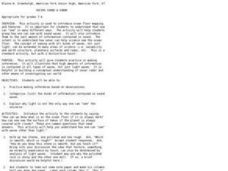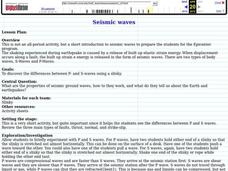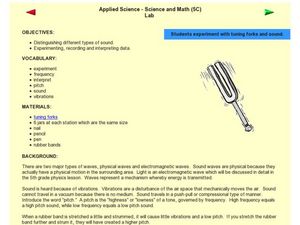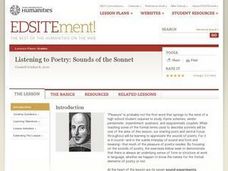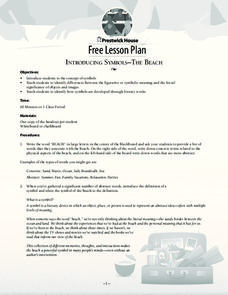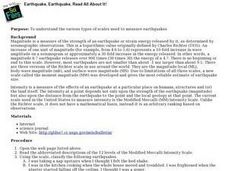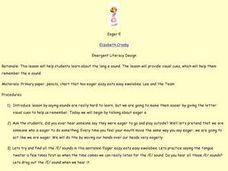K5 Learning
Why Does the Ocean have Waves?
Six short answer questions challenge scholars to show what they know after reading an informational text that examines waves—what they are, what causes them, and how different Earth factors affect their size and strength.
Curated OER
Properties of Waves
Third graders observe and investigate wave properties and compare the properties of particles and waves. They fill a pie pan half full with water, place a toothpick in the center of the pie pan, then drop a marble into the pan and...
Curated OER
Wonderful Waves - Wave Model
Pupils demonstrate that simple models can be used to represent real world objects that are not easily brought into a classroom. They create a wave model using two different types of simple models.
Curated OER
Seeing Sound & Sonar
Students make inferences based on different sounds that they hear. For this inferences lesson plan, students will hear sounds of different objects and describe the sounds based on what they hear. They will answer various questions about...
Curated OER
Playing With Science
Young scientists investigate the scientific concepts and principles that help make common toys such as hula hoops, yo-yos, slinkies, and silly putty work. As a class, they read "Backyard Rocket Science, Served Wet" to get a look behind...
Curated OER
Take-Home Midterm Exam #3
The University of Hawaii has published a vast collection of midterm and final exams for their Physics 152 course. This particular exam offers a variety of assessment methods, and covers the topic of electromagnetic radiation....
Curated OER
Seismic waves
Students discover the differences between P- and S-waves using a slinky. They see that when displacement occurs along a fault, the built up strain of energy is released in the form of seismic waves.
Curated OER
Using Different Types of Sentences
In this types of sentences worksheet, students use a variety of sentences to make their writing interesting. Students complete three activities to help them with different sentences.
Curated OER
Waving Flag
In this waving flag worksheet, students listen to the song, fill in the missing words, complete a crossword and word search, and more. Students complete 5 activities.
Curated OER
The Sonnet Challenge
Young scholars are given information about two popular sonnet forms-English and Italian. They are given the rules for writing a sonnet. Students are asked what type of sonnet they would use. They are each given a sheet of paper and...
Curated OER
Woodwind Instruments and Pitch
Students explore musical pitch. In this cross curriculum musical instruments and "sound" physics lesson, students identify and describe common traits of woodwind instruments. Students research "pitch" and what causes pitch fluctuation by...
Curated OER
Types of Questions - Tenses
In this question tense worksheet, students analyze 17 sentences before writing the sentences in a table. They separate the sentences by question tense and type into the proper section of the table.
Curated OER
Sound Observations
Learners explore sound waves by conducting an experiment in class. In this sound frequency lesson, students utilize a tuning fork in class and identify which objects in class create different sound pitches on the fork. Learners conduct...
Curated OER
Listening to Poetry: Sounds of the Sonnet
Students investigate how sound influences meaning in poetry by listening to sonnets. They write an analysis after listening to and reading sonnets.
Curated OER
Pitching Patriotism
Students analyze the use of color, images and type used in print advertising, then "pitch" a company. They, in groups, brainstorm products and services of companies that may be affected by the war in Iraq.
Curated OER
Coasts
Young scholars explain the different types of marine coasts and where they are located in the United States and its territories. They explain and identify some of the life forms that inhabit different marine coastal regions.
Curated OER
English Exercises: Mysteries of Anatomy
Consider this online interactive activity as a way to practice the names that often accompany human anatomy, such as the crown of the head and the roof of the mouth. Learners select an anatomy word with a double meaning from a drop-down...
Curated OER
What is a Haiku? How Do You Write a Haiku?
Haiku poetry is explored in this language arts lesson. Yong readers identify the characteristics of haiku and read several examples. Students make connections between their study of Japan and the poetic form of haiku, and they write...
Prestwick House
Introducing Symbols–The Beach
Looking for a way to introduce class members to the concept of symbolism and multiple levels of meaning? Readers examine two different passages about the beach and consider how the writers use concrete objects, and places to...
Curated OER
The Old Man and the Sea: Guided Imagery
What do you imagine when you think of the sea? Put on some ocean sounds, close your eyes, and listen to a guided meditation based on the imagery from The Old Man and the Sea by Ernest Hemingway. After class members listen to...
Curated OER
At the Beach
In this punctuation worksheet, students read the sentences and add a period, exclamation point, or a question mark to the end of each sentence. Students complete 10 sentences.
Curated OER
Earthquake, Earthquake, Read All About It!
Students utilize the U.S. Geological Service web site. They research the various types of scales used to measure earthquakes and classify different situations on the scale. They write a story about a town that has just experienced a quake.
Curated OER
As a Matter of Fact
Students rotate through various hands-on experiment stations to explore the concept and properties of different types of matter. They compare some properties of solids, liquids and gases and describe how matter changes from one state to...
Curated OER
Eager E
Students complete a variety of activities related to the long /e/ sound. As a class they recite a tongue twister, then trace and write the letter E. Students then play a concentration type game, listen to the book "Lee and the Team,"...



